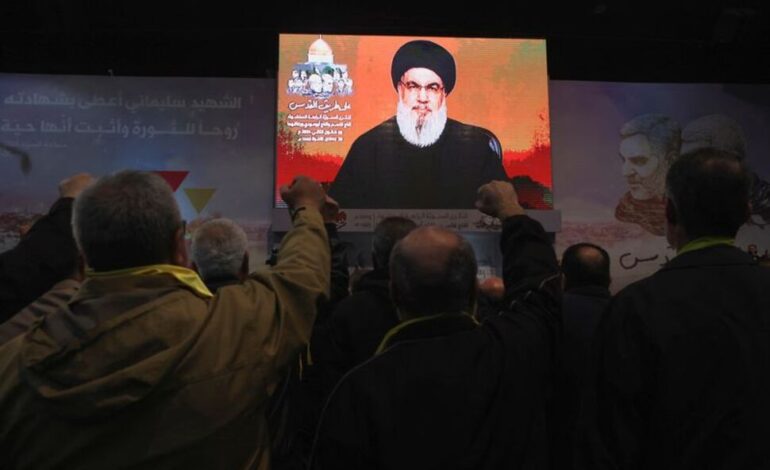BEIRUT — On Wednesday, the head of Lebanon’s Hezbollah said it “cannot be silent” after the killing of Hamas’ deputy leader in the suburb of Beirut and warned that his heavily armed forces would fight to the finish if Israel chose to extend war from Gaza to Lebanon.
Israeli forces meanwhile kept up their aerial and ground assaults against Palestinians, telling civilians to leave a refugee camp in the north of the Palestinian enclave.
Israel, which has laid waste to the Gaza Strip in an onslaught to wipe out its ruling Hamas group, has neither confirmed nor denied that it assassinated Saleh al-Arouri in a drone strike in the Lebanese capital on Tuesday.
But its military spokesperson said Israeli forces were in a high state of readiness and prepared for any scenario.
Nasrallah said there would be “no ceilings” and “no rules” to Hezbollah’s fighting if Israel launched a full war on Lebanon.
Arouri’s killing was a further sign that the nearly three-month-old Israeli war on Gaza was spreading well beyond the Strip, drawing in Palestinian resistance in the Israeli-occupied West Bank, Hezbollah forces on the Lebanon-Israel border and even Red Sea shipping lanes.
Arouri, 57, who lived in Beirut, was the first senior Hamas political leader to be assassinated outside Palestinian territories since Israel began its offensive against the Palestinian Islamist group in response to its deadly rampage from Gaza into Israeli settlements on Oct. 7.
In a televised speech in Beirut, Hezbollah leader Sayed Hassan Nasrallah vowed that his powerful Iran-backed Shi’a militia “cannot be silent” in the wake of Arouri’s killing, which he called “a major dangerous crime”, though he made no concrete threats of action against Israel.

Head of Hamas delegation Saleh al-Arouri speaks during a reconciliation deal signing ceremony in Cairo, Egypt, October 12, 2017. – File photo
Nasrallah said there would be “no ceilings” and “no rules” to Hezbollah’s fighting if Israel launched a full war on Lebanon.
“Whoever thinks of war with us, in one word, he will regret it. If war is launched against Lebanon, then Lebanon’s national interests require that we take the war to the end.”
Hezbollah, a Hamas ally, has been embroiled in nearly daily exchanges of shelling with Israel across Lebanon’s southern border since the Gaza war began. More than 120 Hezbollah fighters and two dozen civilians have been killed on Lebanese territory, as well as at least nine Israeli soldiers in Israel.
Hezbollah and Israel last fought a major war in 2006 and it ended in essentially a stalemate. Analysts say Hezbollah has become a more formidable fighting force since, with thousands of rockets, missiles and other heavy weaponry.
The U.N. peacekeeping mission in south Lebanon warned that any escalation “could have devastating consequences for people on both sides of the border.”
Arouri’s death removes a big name from Israel’s most-wanted list of top Islamist foes, but could drive Hamas’ exiled leaders deeper into hiding, hampering efforts to negotiate further Gaza ceasefires and hostage releases.
Hamas politburo member Hossam Badran said in a eulogy for Arouri, “We say to the criminal occupation (Israel) that the battle between us is open.”
Israel had long accused him of orchestrating attacks on its citizens. But a Hamas official said he was also “at the heart of negotiations” conducted by Qatar and Egypt over the outcome of the Israeli war on Gaza war and the release of Hamas-held Israeli hostages.
Nasrallah also said Hamas’ lightning incursion on Oct. 7 dealt a severe and deliberate blow to a process of normalization between Israel and various U.S.-backed Arab governments unfolding since 2020, even after the collapse of talks on a Palestinian state in Israeli-occupied territory.
Nasrallah spoke to commemorate four years since the killing of Iranian Revolutionary Guards top commander Qassem Soleimani in a U.S. drone strike in Iraq. Two explosions on Wednesday during a memorial ceremony at a cemetery in southeastern Iran where Soleimani is buried killed more than 100 people, at a time of high tension between arch-enemies Iran and Israel.






Leave a Reply